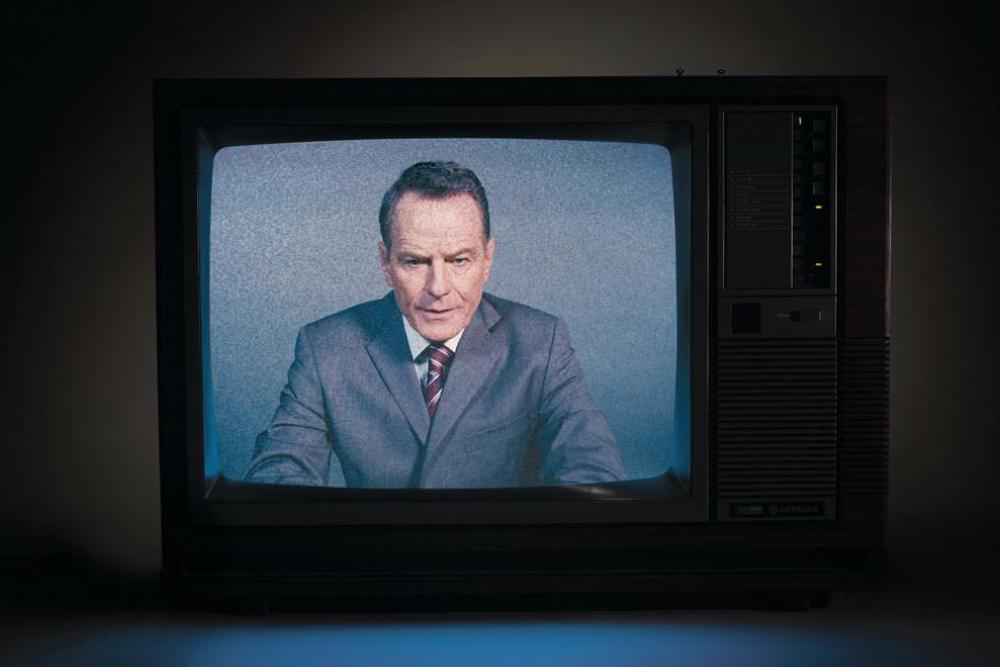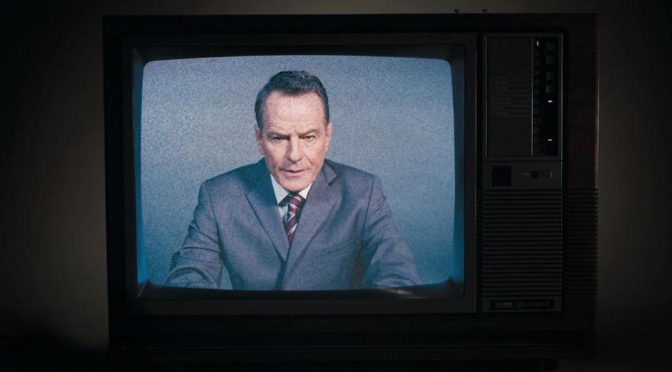By Susan Bennett and Sonia Massai
Susan Bennett is University Professor in the Department of English, University of Calgary, Canada. She is widely published across a variety of topics in theatre and performance studies, including Theatre Audiences (1997), Theatre & Museums (2013) and Sound (2019).
Sonia Massai is Professor of Shakespeare Studies at King’s College London, UK. She has published widely on the history of the transmission of Shakespeare in print and in performance. She is currently working on a new book on Shakespeare’s Accents: Voicing Identity in Performance and preparing a new edition of Richard III for the Arden Shakespeare.
When asked “What is politics?,” director Ivo van Hove’s answer is straightforward and uncompromising: “Politics is the antithesis of absolute truth.”
None of his shows are more effective in putting across this point than Network. Adapted by Lee Hall from Paddy Chayefsky’s script for the 1976 movie that won Peter Finch a posthumous Academy Award for his role as anchorman Howard Beale, Network paints a bleak picture of a media-saturated culture where spectacle, ratings and profit trump truth, authenticity and traditional journalistic ethics. Talking about Network, van Hove explains that while the movie worked as a satire of the 1970s media landscape, his production turns it into a tragedy:
When I saw the film in the 1970s, it felt like an impossible future; we are now living that impossible future.
What does our impossible present, dominated by social media, mass digital communication and fake news, look like? Van Hove’s stage designer and life-long partner Jan Versweyveld merges in a single, vast, layered set the corporate world of the news studios, and the bars, restaurants and domestic spaces inhabited by the main characters. He also merges the TV audience with the live audience, which can watch the show from the auditorium or eat a posh restaurant dinner on stage.
Played as a deranged but charismatic prophet by Bryan Cranston, Beale gets the theater audience to echo the voices of the millions of Americans in the film who got out of their chairs, opened their windows, stuck their heads out and shouted “I am mad as hell, and I am not going to take this anymore.” The result is that the tremendous but still relatively contained power of TV in the 1970s becomes all-pervasive on stage. Beale is at his most dangerous in the movie when he urges viewers to turn off their TV sets. Now, van Hove suggests, there is nowhere for us to hide. If we all to turn off our TVs, we’ll still have all the electronic devices that get us through the day, whether at work or at play. This production intimates that we are no longer manipulated by the network. Now, we are networked.
If Network makes a tragedy of our contemporary political times, other van Hove productions that have made their way to NYC have offered differently bleak perspectives. The Damned, the director’s stage version of Luchino Visconti’s 1969 film La caduta degli dei (“the fall of the gods”), seen at the Park Avenue Armory in July 2018, trades media saturation for the rise of authoritarianism. It follows the collapse of a steelworks empire when the company’s CEO, Joachim von Essenbeck, is murdered on the night the Reichstag burns in 1933. Working with the prestigious Comédie Française, van Hove delivered a spectacular event designed to test his audience through all manner of sensory assaults — not the least of which was simulated machine-gun fire aimed directly at them. As Essenbeck family members struggle to assume power after the father’s death and in the knowledge that the Nazis want to appropriate steel production for military purposes, no viable model of political resistance is offered. Instead the audience confronts a series of shocking representations: incest, pedophilia, an orgy of gay sex and a cruel tarring-and-feathering of the Essenbeck daughter. And as each character inevitably takes up a place in a bank of coffins at stage left, the audience is left to contemplate the terrors that inevitably accompany the ascendance of authoritarian governments.

No spectator can miss the connections to contemporary dangers that pulsate from the stages of Network and The Damned or misunderstand the very real risks of complicity from the simplest acts of participation (“I am as mad as hell,” the theatre audience chants). But The Fountainhead, van Hove’s dramatization of Ayn Rand’s 1943 novel, staged as part of the Brooklyn Academy of Music’s New Wave Festival in 2017, appeared to reproduce uncritically a text worshipped by the conservative political class, including Donald Trump and many others in today’s Republican Party. The Fountainhead celebrates the out-of-control ego of Howard Roark, Rand’s protagonist, who revels in the on-stage rape of his would-be lover. Whether it was the brutality of the sexual assault or the relentlessly slow pace of the four-hour-plus production, many spectators did not return after intermission, continued to leave during the second half, and even withheld applause at play’s end.
The political worlds envisaged by van Hove and Versweyveld in Network and The Damned leave little or no room for resistance and show no alternative to the Nietzschean will-to-power in The Fountainhead. However, it would be wrong to think of van Hove’s theater as an exercise in glamorizing the failures of liberal humanism and modern democracies. His theater, in fact, is deeply affective; it’s as far from political theater that alienates in order to educate as poetry is from propaganda. It is also life-like in showing us worlds and characters that are fluid and ambivalent. Even van Hove’s Coriolanus and Richard III in his epic history cycles, Roman Tragedies (staged at BAM, 2012) and Kings of War (staged at BAM in 2016), seemed appallingly human. The omission of “the people” from the Shakespearean source texts highlighted their psychotic lack of connection with others, showing that what leads to the fall of even the most brutal of leaders is their failure to realize their humanity.
“Politics is also the determining possibility of each individual to speak and act in the world and to make a new beginning.”
The life-like quality of van Hove’s theatrical worlds and the characters he shows us suggests that any truth can become tyrannical if enforced on others as the only truth. Politics is not only the antithesis of absolute truth; drawing from the work of philosopher and political theorist Hannah Arendt, his work seeks to prove that “politics is also the determining possibility of each individual to speak and act in the world and to make a new beginning.” Van Hove’s political theater offers ideas presented as living and breathing individuals, with their weaknesses and contradictions, their passions and their drives. We might love it or hate it, it might move us or outrage us, but it never fails to touch us and make us think. Van Hove’s political theater is our second chance to think, and think again.
Ivo van Hove: From Shakespeare to David Bowie, edited by Susan Bennett and Sonia Massai, is available from Methuen Drama.
This piece was originally written for the Clyde Fitch Report and has been reproduced here with permission of the authors and the editor.
You may also like to read:
- Reinventing stardom on the Strand
- Shakespeare at war
- Figuring Gender difference in Phyllida Lloyd’s Shakespeare trilogy
Blog posts on King’s English represent the views of the individual authors and neither those of the English Department, nor of King’s College London.
If you have any comments on this interview, or would like to ask Sonia or Susan any further questions, please use the ‘Comments’ section of this blog post.
Photo: Bryan Cranston in “Network.” Property of the National Theatre.

